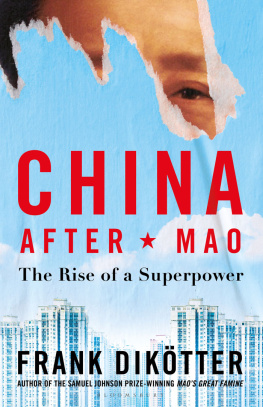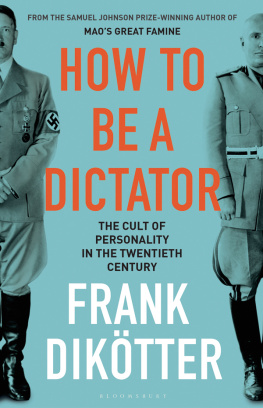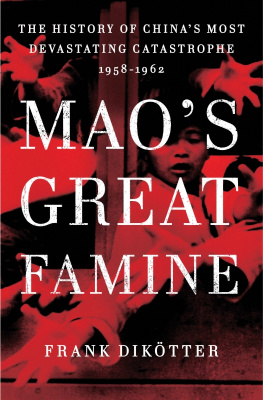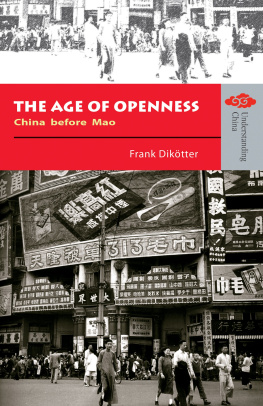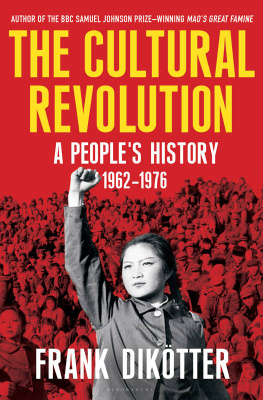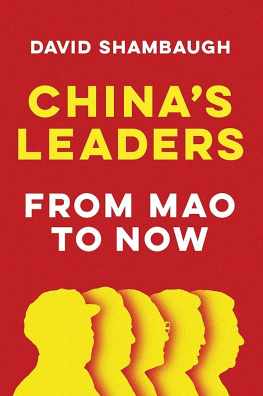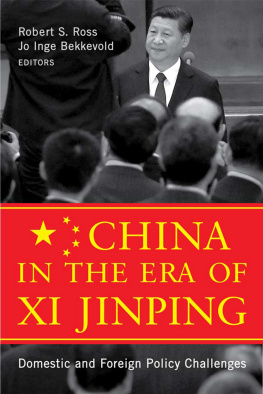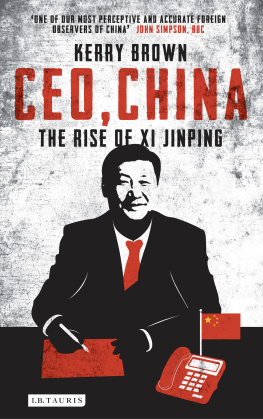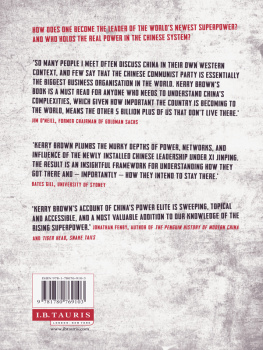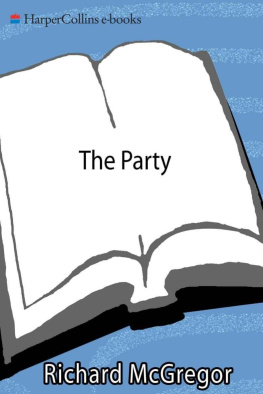
CHINA AFTER MAO

BLOOMSBURY PUBLISHING
Bloomsbury Publishing Plc
50 Bedford Square, London, WC1B 3DP, UK
29 Earlsfort Terrace, Dublin 2, Ireland
BLOOMSBURY, BLOOMSBURY PUBLISHING and the Diana logo are trademarks of Bloomsbury Publishing Plc
First published in Great Britain 2022
This electronic edition first published in 2022
Copyright Frank Diktter, 2022
Map John Gilkes, 2022
Frank Diktter has asserted his right under the Copyright, Designs and Patents Act, 1988, to be identified as Author of this work
[For legal purposes the constitute an extension of this copyright page]
All rights reserved. No part of this publication may be reproduced or transmitted in any form or by any means, electronic or mechanical, including photocopying, recording, or any information storage or retrieval system, without prior permission in writing from the publishers
Bloomsbury Publishing Plc does not have any control over, or responsibility for, any third-party websites referred to or in this book. All internet addresses given in this book were correct at the time of going to press. The author and publisher regret any inconvenience caused if addresses have changed or sites have ceased to exist, but can accept no responsibility for any such changes
A catalogue record for this book is available from the British Library
ISBN: HB: 978-1-5266-3428-3; TPB: 978-1-5266-3429-0;
EBOOK: 978-1-5266-3433-7; EPDF: 978-1-5266-5744-2
To find out more about our authors and books visit www.bloomsbury.com and sign up for our newsletters
Contents
In the summer of 1985, when Back to the Future became the highest grossing film of the year, I set off to study Mandarin in China as a student from the University of Geneva, Switzerland. The Chinese Ministry of Foreign Affairs assigned me to Nankai University in Tianjin, a large coastal metropolis near Beijing with a population of 5 million (today the city has trebled in size). I flew to Hong Kong where I crossed the border, taking a week to travel up north by train, making friends on the way. One of them could not remember my surname and later sent me a postcard addressed to Frank from Holland, Tianjin, China. The post office had no trouble finding me, since there were only eighty foreigners in town, including seven Dutch nationals and one Frank.
Like all major cities, Tianjin had a network of wide boulevards built in the 1950s with the help of Soviet experts. There was no gridlock: there were fewer than 20,000 private vehicles in this nation of more than a billion people. But fenced off from buses and trucks and the occasional car, drifts of closely packed commuters quietly pedalled along designated side lanes. Since they got up at the crack of dawn and went back home before dusk, the city fell quiet at nine in the evening. I sometimes had all six lanes to myself, the lampposts shining a dim light on my bicycle at night.
I returned to Nankai University on the occasion of its centennial celebration in October 2019. Tianjin seemed transformed, its skyline ablaze with glittering skyscrapers, its urban sprawl reaching far and wide with a seemingly endless agglomeration of apartment buildings and office parks, some finished, others still under construction. Wherever one stood, on a clear day the Tianjin Finance Centre could be seen towering almost 600 metres into the sky, its glass glinting in the sunlight like a giant crystal spire. But appearances can be deceptive. My erstwhile teachers and their successors lived in the same shabby, concrete blocks with potted plants crammed onto dusty balconies, the corridors cluttered with battered bicycles used to get around campus. There was one difference, I was told: the children of most professors were now in the United States.
A few years ago the Peoples Republic of China officially celebrated forty years of Reform and Opening Up, the term given to the programme of economic reforms inaugurated by Deng Xiaoping in December 1978. The transformation of an insulated country reeling from the chaos of the Cultural Revolution into the worlds second-largest economy is invariably hailed as a miracle. The title of one scholarly tome How the Miracle Was Created sums up the prevailing view. A cause of concern for some experts, apparently, is not whether there really was a miracle in the first place but whether it might actually have come to an end.
But how would the experts know? After I moved into my dormitory 35 years ago, I noticed that many foreign students spent a great deal of time speculating about what was happening in Beijing. Some of them became China watchers. Their technique was borrowed from Kremlin watchers: lack of reliable information forced them to scrutinise the most abstruse signs for clues about Zhongnanhai, the party headquarters next to the Forbidden City in Beijing, from the position of each leader on the reviewing stand when parades were held in Tiananmen Square and the layout of news articles in the Peoples Daily to the frequency of certain phrases on the radio. I was sceptical and preferred to study the past.
I remain sceptical. Contrary to what one might reasonably expect after forty years of Reform and Opening Up, the situation is not so very different today. A few years ago Li Keqiang, Chinas current premier, referred to the countrys figures for domestic output as man-made and therefore unreliable. Experts, of course, know this, and find ways around it. There is, for instance, a Li Keqiang index, one the premier used himself to monitor economic performance by scrutinising total electricity consumption. But the fact remains that we know very little. As the China observer James Palmer put it recently, Nobody Every piece of information is unreliable, partial or distorted. We do not know the true size of the economy, since no local government will report accurate numbers, and we do not know the extent of bad loans, since the banks conceal these. Every good researcher has the Socratic paradox in mind: I know that I dont know. But where China is concerned, we dont even know what we dont know.
Just across the northern gate of Nankai University, on the other side of a congested eight-lane thoroughfare, a large, cavernous building guarded by young soldiers houses the Tianjin Municipal Archives. Access would have been unthinkable when I was still a student. But in 1996 the law regulating access to the archives was amended and increasing quantities of declassified material gradually became available to professional historians armed with a letter of recommendation. Even if the most sensitive information remained safely locked away deep inside the archival vaults, for the first time researchers were allowed to delve into the dark night of the Maoist era.
I spent a decade examining thousands of party records, travelling the length and breadth of the country from subtropical Guangdong to poor and arid Gansu, a province near the deserts of Mongolia. Inside yellowing folders, scribbled in longhand or neatly typed, were secret minutes of top party meetings, investigations into cases of mass murder, confessions of leaders responsible for the starvation of millions of villagers, reports on resistance in the countryside, confidential opinion surveys, letters of complaint written by ordinary people and much more besides. I wrote three books known as the Peoples Trilogy, on the fate of ordinary people under Mao.
The timing was fortunate. After Xi Jinpings ascent to power in November 2012, the archives began closing down again. Large batches of documents on Maos Great Famine and the Cultural Revolution have since been reclassified. But, paradoxically, the last couple of years have been a good time to explore the decades of Reform and Opening Up. For years the Chinese people, including every archivist, have been told that nothing short of an economic miracle took place after 1978, one that has left foreign capitalists gasping for breath. A dark cloud hangs over the Mao era, but it dissipates the moment the term economic reform is invoked. Now, for the first time, we can actually use the evidence produced by the Communist Party to examine the history of the Communist Party since 1976.
Next page
